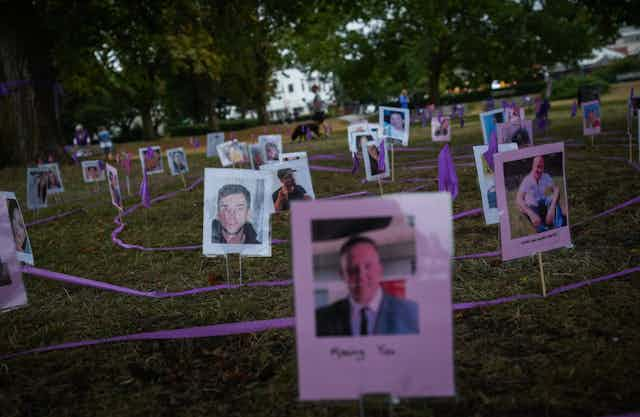British Columbia is experiencing an unprecedented opioid crisis. Drug overdoses are the leading cause of death in the province for those aged 10 to 59. B.C., and all of Canada, are trying hard to help those with substance abuse problems and addictions.
Among the responses are calls to destigmatize addiction. Mostly, these calls encourage us to consider how the language we use can stigmatize people struggling with addiction. Language does of course have a powerful impact, but not as powerful as policy.
I am the executive director of a bed-based treatment facility in Metro Vancouver. We help people dealing with substance abuse get better. My doctoral research is on addiction stigma. It gives me a unique perspective on the roadblocks to getting out of addiction.
In my work, we often come across B.C. government policies requiring a minimum amount of sobriety, usually a year, before enrolment. Most commonly, these are associated with educational programs for those doing work connected to mental health and addictions. It also occurs in provincial programs aimed at employment or re-training.
We say we want to destigmatize addictions. But if we are refusing to help people in recovery get back to work or school, what are we actually doing?
Policies discouraging recovery
These policies stigmatize people in early recovery by essentially telling them they aren’t sober enough to invest in. This discourages them from staying in recovery. We are saying they aren’t good enough and, in some cases, they hear that they’ll never be good enough.
These policies are, in part, about risk aversion. Why put money into helping someone re-train if they are at high risk of relapsing? The average taxpayer may even agree that we should restrict who can access government programs along these lines. However, these policies are rooted in stigma. They fundamentally change how people experience the programs, and risk aversion does more harm than good.

Let’s say, on average, the policy is that someone needs to be clean and sober for a year before they can access certain government services. This means the people who access the services will generally be pretty successful in completing those programs, considering they already have been sober a year. People get to school or work, agencies get a completion statistic, and we all get to feel good for helping someone get back on their feet. The policy means that people with a year sober get the help they deserve.
It also means fewer people will reach that year mark. Recovery capital is a concept that says having more support makes overcoming addiction easier. These supports are holistic and can include things like counsellors or mental health supports, but also hobbies, friends, and life fulfilment. School and work are big parts of recovery capital. People in recovery want to feel like they are moving forward. A rolling stone gathers no moss.
If someone is unable to count in their recovery capital the social support and life-meaning that school and work provide, they are less likely to succeed. We weaken people’s recovery capital when we exclude them from pursuing fulfilment. It can mean the difference between someone staying in recovery and going back to their old ways.
Destigmatizing language
B.C.’s strategy for destigmatizing addiction focuses on considering the language that we use. Stigmatizing language is damaging. It is mean and stops people from asking for help. But part of my doctoral research asks: what is the worst of the worst? The answer I have so far is that stigmatization is at its worst when it marginalizes an individual.
In terms of addiction and treatment, marginalization means socially separating someone who has nowhere else to go. When someone who has grappled with addiction throughout their entire life makes an effort to break free from its grip, only to encounter rejection, they experience marginalization. They don’t want to go back to addiction, but because of policies on sobriety, they cannot move forward.

Recovery requires re-learning how we see ourselves. It is taking the jump from one life to another. It means getting vulnerable and asking for help. I’ve seen firsthand how important it is for people to feel accepted. It makes sense, considering they are putting themselves out there to start a new life. This feeling of insecurity is something we can all relate to.
We can destigmatize addictions and support people in recovery by creating policies that recognize the difference between addictions and recovery. We should not just tell people they are good enough; we should help them see themselves as worthy.
Find balance in policy
I’m not saying to completely do away with policies on sobriety requirements that provide structure for government services. There are safety concerns that agencies are not specialized in accommodating. But we need to recognize the impact that these policies have and seek balance.
In my experience, someone with three months of sobriety starting to get back into work or school is just as steadfast in their recovery as someone who has stayed sober for a year. This begs the question of who these policies are actually helping. Is someone who has been sober for months still struggling with addiction? Are we inadvertently marginalizing someone new to recovery by labeling them by their past rather than present?
We should not be afraid to give people in recovery a chance at getting a new life. By reconsidering these policies, we stand a better chance at destigmatizing addiction in a meaningful way. Hopefully, we can even save lives.
If you or someone you know is struggling with substance abuse, know that there is help available. Do not be afraid to ask for it.

